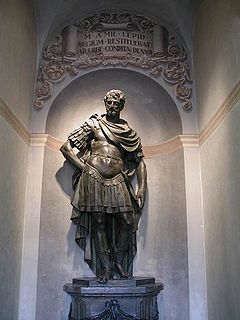Related Research Articles

Lucius Aemilius Paullus was a Roman consul twice, in 219 and 216 BC.

Marcus Manlius Capitolinus was consul of the Roman Republic in 392 BC. He was the brother of Aulus Manlius Capitolinus. The Manlii were a patrician gens.

Marcus Aemilius Lepidus was a Roman consul, Pontifex Maximus, Censor and Princeps Senatus. A scion of the ancient Patrician gens Aemilia, he was most likely the son of Marcus Aemilius Lepidus, with his brothers being Lucius and Quintus.
Manius Acilius Glabrio was a Roman general and consul of the Roman Republic in 191 BC. He came from an illustrious plebeian family (gens) whose members held magistracies throughout the Republic and into the Imperial era.
Publius Aelius Paetus was a Roman consul of the late 3rd century BC. He was a prominent supporter and ally of Scipio Africanus, and was elected censor with Africanus in 199.
Lucius Aemilius Barbula, or Lucius Aemilius Q.f. Q.n. Barbula, was a Roman politician and general from the patrician gens Aemilia. He was elected consul for 281 BC and was given a command against the Samnites. He invaded the territory of Tarentum, which summoned Pyrrhus of Epirus for help. In 280, he was awarded a triumph for his victories in Tarentum, Samnium, and elsewhere.
Marcus Fulvius Flaccus was a consul in 264 BC. In the tradition of Livy his praenomen is "Quintus".
Publius Cornelius Cethegus, Roman statesman, was a member of the gens Cornelia of the branch with the cognomen Cethegus.
Marcus Atilius Regulus, consul in 294 BC, was the second man from the gens Atilia to become consul of Rome.
Aulus Postumius Albus Regillensis was a patrician politician of ancient Rome, and apparently son of Aulus Postumius Albus Regillensis, and therefore brother of Spurius Postumius Albus Regillensis. He, or possibly his brother Spurius, was appointed to dedicate the Temple of Castor in 484 BC as duumviri aedi dedicandae.
Titus Verginius Tricostus Caeliomontanus was a Roman statesman who served as Consul in 496 BC. He is probably the (older) brother of Aulus Verginius Tricostus Caeliomontanus, consul in 494 BC.

Aulus Cornelius Cossus was a Roman politician and general who lived in the fifth century BC.
Titus Genucius Augurinus was a Roman politician in the 5th century BC, consul and decemvir in 451 BC.
Publius Sestius Capitolinus Vaticanus was a Roman politician in the 5th century BC, consul in 452 BC and decemvir in 451 BC.
Publius Curiatius Fistus Trigeminus, or Publius Horatius Pulvillus, was a Roman politician in the 5th century BC, consul in 453 BC, and decemvir in 451 BC.
Aulus Manlius Vulso was a Roman politician in the 5th century BC, and was a member of the first college of the decemviri in 451 BC. In 474 BC, he may have been elected consul with Lucius Furius Medullinus. Whether or not the decemvir is the same man as the consul of 474 BC remains unknown.
Lucius Furius Medullinus Fusus was a Roman politician in the 5th century BC, and consul in 474 BC.
Lucius Lucretius Tricipitinus was a Roman senator in the fifth century BC, and was consul with Titus Veturius Geminus Cicurinus in 462 BC.
Quintus Minucius Esquilinus Augurinus was a Roman consul in 457 BC. Quintus served with Gaius Horatius Pulvillus. His brother Lucius Minucius Esquilinus Augurinus also was a consul the year before him in 458 BC. His term saw domestic peace, after a previous assault by the Aequi under the previous consulars.
References
- ↑ T. Robert S. Broughton: The Magistrates Of The Roman Republic. Vol. 1: 509 B.C. - 100 B.C.. Cleveland / Ohio: Case Western Reserve University Press, 1951. Reprint 1968. (Philological Monographs. Edited by the American Philological Association. Vol. 15, 1), p. 410
- ↑ T. Robert S. Broughton: The Magistrates Of The Roman Republic. Vol. 1: 509 B.C. - 100 B.C.. Cleveland / Ohio: Case Western Reserve University Press, 1951. Reprint 1968. (Philological Monographs. Edited by the American Philological Association. Vol. 15, 1), p. 402
- ↑ Livy Ab urbe condita XVII 10,10-12
| Preceded by Lucius Postumius Albinus and Marcus Popillius Laenas | Consul of the Roman Republic with Gaius Popillius Laenas 172 BC | Succeeded by Publius Licinius Crassus and Gaius Cassius Longinus |
| This article about an Ancient Roman politician is a stub. You can help Wikipedia by expanding it. |